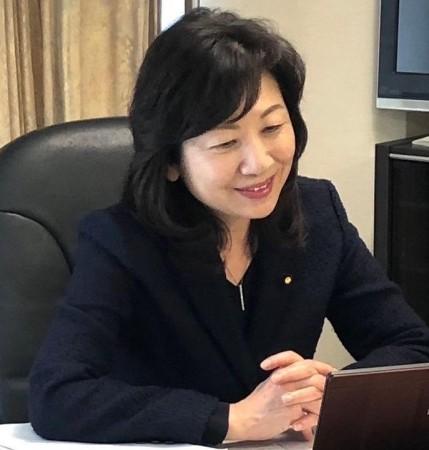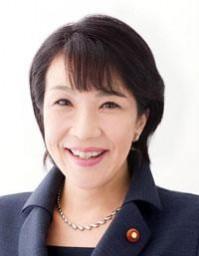Despite the Constitutional guarantee of equality, Japanese women activists often complain about conservative culture perceivable in the Asian country where certain traits have been so deep-routed that even questioning them push them into trouble.
First and foremost, women descendants of the Japanese royalty are still not considered eligible to inherit the Chrysanthemum throne that is strictly confined to their male counterparts. But, the Constitution doesn't discriminate women from becoming the Prime Minister per se.

Though several women leaders within LDP and opposition rose to prominence in the post-war period, this is the first time that two former women ministers -- Sanae Takaichi and Seiko Noda -- have thrown theit hats into the prime ministerial race. All the four candidates in the race have two weeks to go before drumming up support within the party to become the next Prime Minister of Japan. But to be precise, the decades-old factions play the key role as ever.

Though gender bias never showed up ever since 1947 when the Post-War Constitution was adopted by Japan, the ruling Liberal Democratic Party's long history never showed significant support to any woman leader either to become the Prime Minister.
Since none of the four candidates are seen strong enough to muster majority support, for the first time the two women contenders stand a chance to get elected, if their campaigning and convincing skills are put to best use.
Current Scenario
Besides Takaichi and Noda, former foreign affairs minister Fumio Kishida and former minister in charge of the vaccine rollout in Japan Taro Kono have emerged as the strong contenders. In fact, Seiko Noda, who is also the party's deputy secretary-general, made a last minute entry into the race after securing the barely needed support from 20 lawmakers, while Takaichi enjoys the support of more than 90 lawmakers in the party already.
On Friday, the two-week campaigning was kicked off for a crucial Sept 29 vote with debates, open town hall meetings and TV appearances scheduled by the four candidates. To win comfortably, a candidate requires a minimum of 383 out of 766 votes of LDP lawmakers. If nobody wins in the first round, the top two will face a runoff, which will be decided with votes from 383 lawmakers and 47 prefectural representatives.

Fumio Kishida, the strong man
Kishida was the first to declare his candidature stressing the need for one in the current times, obviously referring to Covid pandemic and tension with neighbours in the region. Moreover, he enjoys the support of former Prime Minister Shinzo Abe.
His main rival, Taro Kono, who was in forefront of the Covid fight said, "I want to move Japan forward by pushing a heavy door that is in front of us open once again." He is also supported by major LDP factions.
However, there is no clear front-runner as yet leaving the race open for women contenders Takaichi and now Noda to vie for the top post.
Sanae Takaichi expressed her determination and showcased the presence of over 90 lawmakers and representatives of lawmakers in her rally, whom she described as her "strongest allies" sharing similar views on state and economic policies, regardless of their factions.
Seiko Noda, despite being the last entrant, vowed to stand for the vulnerable members of society and nurturing tolerance in politics. She declared that politics "should not be carried out by powerful leaders" but by those with citizens' best interests in mind. She also stressed on weighing the public sentiment in policymaking.
However, going by the image as a strongman in the party, Kishida's intrepid campaign in the last one year has made him emerge as the one who could stand up against the outgoing Prime Minister Yoshihide Suga's efforts to widen his party base.

One expectation from the winner is to take the party to elections soon, amid the COVID-19 debacle in Japan, staggering national debt and relations with neighbouring Koreas. If this factor remains the major motive behind party legislators and representatives, then Kishida stands a better chance to get elected.
Nonetheless, the efforts of Takaichi and Noda will prepare the party weigh for a future leader who will become the country's first woman Prime Minister as well.
Next two weeks will see who can muster enough support and take the party to elections next. If either Takaichi or Noda wins the race, then the 100th Prime Minister of Japan will be a woman, who will steer the wheels of economy amid the Covid pandemic.
















